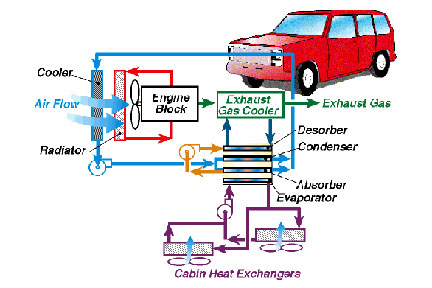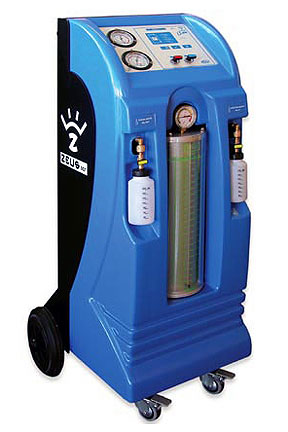Winter may be colder than usual where you live; now a hotter than usual summer is predicted. Thus, your air conditioner will have to work even harder. Will it be up to the task?

|
| Typical automotive air conditioning system. |
How can tell if an A/C system is working properly? "There's a simple test for any A/C system," says Paul DeGuiseppi, manager of service training for the Mobile Air Conditioning Society Worldwide. "Set all the controls for maximum cooling, close all the doors and windows, start the engine and run it for about five minutes. It's important that you have the vehicle in the shade, or out of direct sun when performing this check. If the temperature from the panel outlets gets cold, there a good chance the system is operating properly. If you have a thermometer, place it in a center outlet, and if it's a warm day and the temperature is below 50 degrees F, it's a good sign that the system is cooling."
If the A/C is not cooling properly, it may be leaking refrigerant. This is not only harmful to the environment but may lead to costly repairs. If it is not leaking and the mechanical components are in good shape, the A/C should operate properly. There is no need to have the refrigerant cleaned or replaced. Unfortunately, there is no way to determine how much refrigerant is in a system without removing existing refrigerant with proper recovery equipment and then recharging the system.
Air conditioning repairs are not a do-it-yourself project today. Servicing must be done by a certified mobile A/C technician. Section 609 of the U. S. Clean Air Act requires that all automotive technicians opening the refrigeration circuit of an automotive A/C system be certified to recover and recycle the refrigerant. Venting of refrigerant into the atmosphere contributes to global climate change. Certified professional technicians also have the tools, equipment and knowledge to properly recover and recycle refrigerant and make the proper repairs.

|
| Servicing air conditioning systems today requires specialized equipment and certified technicians to assure refrigerants do not escape into the atmosphere. |
However, there are inspections and corrections you can do. First of all, when the A/C is operated, an additional load is placed upon the engine and engine cooling system. To prevent overheating the engine during operation of the A/C system, the engine cooling system must be in top shape and the coolant level must be correct.
Secondly, there are some external inspections and repairs that can, and should be, made. Inspect the compressor drive belt for fraying, cracks, glazing, etc. Also, inspect the hoses and metal tubing for leakage or damage. Look at the compressor for signs of possible shaft seal leakage. Noise coming from the compressor usually indicates impending failure. It can also come from loose support brackets or lines rattling against other components. Clean out any leaves and other debris in front of the condenser. This may require jacking up the vehicle to inspect it from underneath. If the vehicle has a cabin air filter, check to see if it needs to be replaced.
Only two refrigerants are approved for use in automotive A/C systems. For most vehicles manufactured prior to 1995, it is CFC-12 or R-12. For those manufactured after 1995, the approved refrigerant is HFC-134a or R-134a. Using other chemicals in A/C systems may void the warranty. Vehicle and A/C manufacturers do not recommend the addition of other chemicals or so-called performance enhancing additives to the system.
R22, an industrial refrigerant, has been installed in vehicles by repair shops looking to cut costs. There are several hydrocarbon based refrigerants (mostly propane and butane) marketed by aftermarket companies. Hydrocarbon based refrigerants can be dangerous. Propane is heavier than air and butane can accumulate in enclosed places. This could cause an explosion if there is a leak and a spark. Some A/C shops will refuse to work on an A/C system if it contains contaminated refrigerant because disposal costs are high and they can't afford to cross-contaminate other vehicles.
Older air conditioning systems can be retrofitted to R-134a. The change may be expensive and may require replacing compressors, evaporators and components. As long as R-12 is available, there is no real reason to convert to R-134a. Also R-12 systems cool best when charged with R-12. However, converting to R-134a does make sense when an A/C system requires major A/C repairs.




